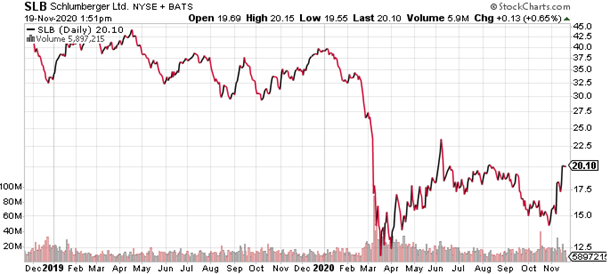Finding oil and gas is vital to economic growth, that’s why it’s time to take a deeper look into a company that is becoming crucial for major players in the industry, explains technology expert Jon Markman, editor of Pivotal Point.
Schlumberger Ltd. (SLB) is a Houston-based company that uses high-performance computing and big data to help every major energy company find oil and gas deposits all over the world.
In 2016, Schlumberger managers took a giant step when they partnered with Google Cloud. Since the middle 1980s, the company has been building the world’s most powerful computers to help geologists make sense of potential deposits located far beneath the Earth’s surface.
Moving computer processing to the cloud brought a major benefit and massive scale. To explore the subsurface, Schlumberger engineers mine acoustic data from seafaring vessels pulling huge spreads of sensors.
Prior to Google Cloud, these spreads, 10 kilometers in length and two kilometers in width, had 1.3 million attached sensors and created 205 terabytes of data every day. With Google, the spreads increased to 1.9 million sensors and generated 1.3 petabytes, or 1,300 terabytes, of data.
All this digital information is analysed in the cloud using artificial intelligence. Engineers can mix the ratio of central and graphic processing units to optimize the results. This flexibility would be impossible with an inhouse supercomputer.
Ashok Belani, executive vice president of technology, previously explained that as the company digitizes internally, it is also transforming oil and gas exploration.
And these companies need all the help they can get as fossil fuels have recently hit a rough patch. In addition to the political pressures to go green, the global economy collapsed in the wake of pandemic lockdowns.
Although clean energy sources have been growing quickly, the Department of Energy still forecasts that fossil fuels will provide 77% of energy consumption through 2040.
And the strong likelihood of a vaccine in 2021 should restart economic activity and reboot the travel industry. Fossil fuels will play an important role when this happens. In other words, Schlumberger’s clients are not going away anytime soon.

Schlumberger shares are currently trading around $20 per share. The stock trades at 24 times forward earnings and 1 times sales. These are reasonable multiples given the financial leverage Schlumberger enjoys.
Shares are down from around $35 in February but should rebound in time. Savvy investors should keep this pick on their radar and use weakness as a potential buying opportunity.










